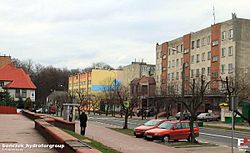Końskie
| Końskie | ||
|---|---|---|

Town centre
|
||
|
||
| Coordinates: 51°12′N 20°25′E / 51.200°N 20.417°E | ||
| Country |
|
|
| Voivodeship | Świętokrzyskie | |
| County | Końskie County | |
| Gmina | Gmina Końskie | |
| Established | 11th century | |
| Town rights | 1748 | |
| Government | ||
| • Mayor | Krzysztof Obratański | |
| Area | ||
| • Total | 35.70 km2 (13.78 sq mi) | |
| Population (2013) | ||
| • Total | 19,962 | |
| • Density | 560/km2 (1,400/sq mi) | |
| Time zone | CET (UTC+1) | |
| • Summer (DST) | CEST (UTC+2) | |
| Postal code | 26-200 to 26-204 | |
| Area code(s) | +48 41 | |
| Car plates | TKN | |
| Website | http://www.umkonskie.pl | |
Końskie [ˈkɔɲskʲɛ] is a town in central Poland with 20,328 inhabitants (2008), situated in the Świętokrzyskie Voivodeship (since 1999), previously in Kielce Voivodeship (1975–1998). Most of the town labour force was employed in the local foundry (Koneckie Zakłady Odlewnicze) in the late 1980s and early 1990s. Since 1997 the town has developed into a major trade centre for small business. Historically, Końskie belongs to the province of Lesser Poland, and since its foundation, until 1795 (see Partitions of Poland), it was part of Lesser Poland's Sandomierz Voivodeship.
The oldest settlement which is now Końskie dates back to the 11th century. The burial ground from this period was discovered in the north part of the town in 1925. Końskie was mentioned in historical sources in 1124 for the first time, with Prandota of Prandocin (the progenitor of Odrowąż family) recorded as the owner of the settlement. For the next few centuries the settlement was owned by the Odrowąż family. Iwo Odrowąż, the bishop of Kraków, founded a parish and built a church dedicated to St. Nicholas in years 1220-1224. The church was torn down in the 15th century and a new Gothic one was built in its place in the years 1492-1520. Some elements of the older Romanesque church were saved in the new one (e.g. the Romanesque tympanum, pictured). Końskie received city rights from King August III Sas on December 30, 1748.
Końskie was briefly visited by Adolf Hitler on September 10, 1939 while on the way to Kielce after landing on an airfield nearby. His car cavalcade visited the headquarters of General Walther von Reichenau at the local mansion. Hitler was followed by director Leni Riefenstahl who came a day later, ordered to film the Nazi German victory over Poland. Reportedly, she fainted when witnessing the random killing of two dozen Jews summoned to dig graves on September 12, 1939 (pictured).
...
Wikipedia


